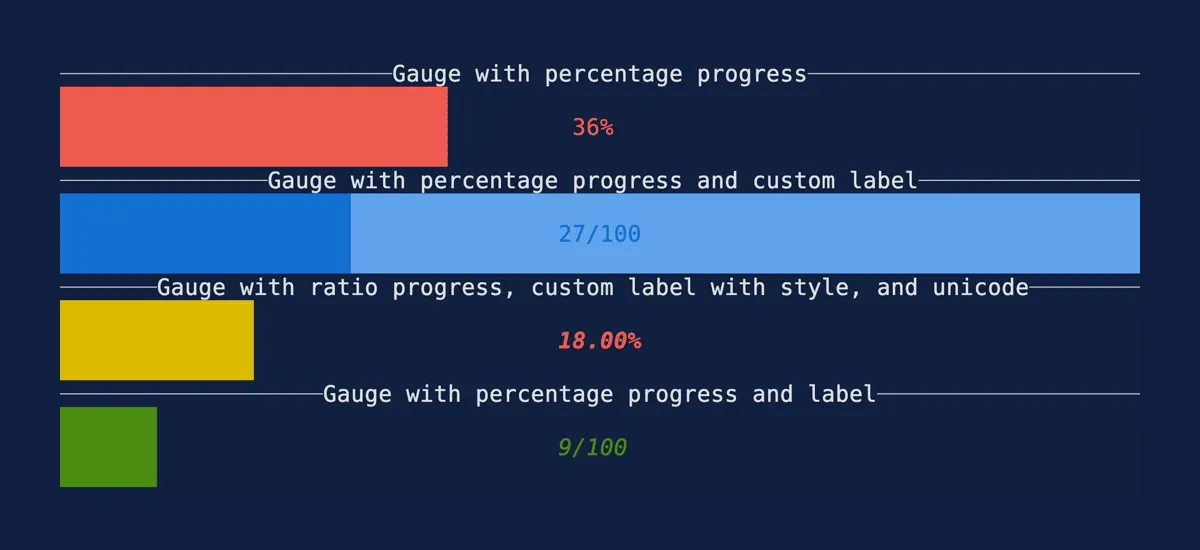Gauge
Demonstrates the Gauge widget.
git clone https://github.com/ratatui/ratatui.git --branch latestcd ratatuicargo run --example=gauge --features=crossterm
//! # [Ratatui] Gauge example//!//! The latest version of this example is available in the [examples] folder in the repository.//!//! Please note that the examples are designed to be run against the `main` branch of the Github//! repository. This means that you may not be able to compile with the latest release version on//! crates.io, or the one that you have installed locally.//!//! See the [examples readme] for more information on finding examples that match the version of the//! library you are using.//!//! [Ratatui]: https://github.com/ratatui/ratatui//! [examples]: https://github.com/ratatui/ratatui/blob/main/examples//! [examples readme]: https://github.com/ratatui/ratatui/blob/main/examples/README.md
use std::time::Duration;
use color_eyre::Result;use ratatui::{ buffer::Buffer, crossterm::event::{self, Event, KeyCode, KeyEventKind}, layout::{Alignment, Constraint, Layout, Rect}, style::{palette::tailwind, Color, Style, Stylize}, text::Span, widgets::{block::Title, Block, Borders, Gauge, Padding, Paragraph, Widget}, DefaultTerminal,};
const GAUGE1_COLOR: Color = tailwind::RED.c800;const GAUGE2_COLOR: Color = tailwind::GREEN.c800;const GAUGE3_COLOR: Color = tailwind::BLUE.c800;const GAUGE4_COLOR: Color = tailwind::ORANGE.c800;const CUSTOM_LABEL_COLOR: Color = tailwind::SLATE.c200;
#[derive(Debug, Default, Clone, Copy)]struct App { state: AppState, progress_columns: u16, progress1: u16, progress2: f64, progress3: f64, progress4: f64,}
#[derive(Debug, Default, Clone, Copy, PartialEq, Eq)]enum AppState { #[default] Running, Started, Quitting,}
fn main() -> Result<()> { color_eyre::install()?; let terminal = ratatui::init(); let app_result = App::default().run(terminal); ratatui::restore(); app_result}
impl App { fn run(mut self, mut terminal: DefaultTerminal) -> Result<()> { while self.state != AppState::Quitting { terminal.draw(|frame| frame.render_widget(&self, frame.area()))?; self.handle_events()?; self.update(terminal.size()?.width); } Ok(()) }
fn update(&mut self, terminal_width: u16) { if self.state != AppState::Started { return; }
// progress1 and progress2 help show the difference between ratio and percentage measuring // the same thing, but converting to either a u16 or f64. Effectively, we're showing the // difference between how a continuous gauge acts for floor and rounded values. self.progress_columns = (self.progress_columns + 1).clamp(0, terminal_width); self.progress1 = self.progress_columns * 100 / terminal_width; self.progress2 = f64::from(self.progress_columns) * 100.0 / f64::from(terminal_width);
// progress3 and progress4 similarly show the difference between unicode and non-unicode // gauges measuring the same thing. self.progress3 = (self.progress3 + 0.1).clamp(40.0, 100.0); self.progress4 = (self.progress4 + 0.1).clamp(40.0, 100.0); }
fn handle_events(&mut self) -> Result<()> { let timeout = Duration::from_secs_f32(1.0 / 20.0); if event::poll(timeout)? { if let Event::Key(key) = event::read()? { if key.kind == KeyEventKind::Press { match key.code { KeyCode::Char(' ') | KeyCode::Enter => self.start(), KeyCode::Char('q') | KeyCode::Esc => self.quit(), _ => {} } } } } Ok(()) }
fn start(&mut self) { self.state = AppState::Started; }
fn quit(&mut self) { self.state = AppState::Quitting; }}
impl Widget for &App { #[allow(clippy::similar_names)] fn render(self, area: Rect, buf: &mut Buffer) { use Constraint::{Length, Min, Ratio}; let layout = Layout::vertical([Length(2), Min(0), Length(1)]); let [header_area, gauge_area, footer_area] = layout.areas(area);
let layout = Layout::vertical([Ratio(1, 4); 4]); let [gauge1_area, gauge2_area, gauge3_area, gauge4_area] = layout.areas(gauge_area);
render_header(header_area, buf); render_footer(footer_area, buf);
self.render_gauge1(gauge1_area, buf); self.render_gauge2(gauge2_area, buf); self.render_gauge3(gauge3_area, buf); self.render_gauge4(gauge4_area, buf); }}
fn render_header(area: Rect, buf: &mut Buffer) { Paragraph::new("Ratatui Gauge Example") .bold() .alignment(Alignment::Center) .fg(CUSTOM_LABEL_COLOR) .render(area, buf);}
fn render_footer(area: Rect, buf: &mut Buffer) { Paragraph::new("Press ENTER to start") .alignment(Alignment::Center) .fg(CUSTOM_LABEL_COLOR) .bold() .render(area, buf);}
impl App { fn render_gauge1(&self, area: Rect, buf: &mut Buffer) { let title = title_block("Gauge with percentage"); Gauge::default() .block(title) .gauge_style(GAUGE1_COLOR) .percent(self.progress1) .render(area, buf); }
fn render_gauge2(&self, area: Rect, buf: &mut Buffer) { let title = title_block("Gauge with ratio and custom label"); let label = Span::styled( format!("{:.1}/100", self.progress2), Style::new().italic().bold().fg(CUSTOM_LABEL_COLOR), ); Gauge::default() .block(title) .gauge_style(GAUGE2_COLOR) .ratio(self.progress2 / 100.0) .label(label) .render(area, buf); }
fn render_gauge3(&self, area: Rect, buf: &mut Buffer) { let title = title_block("Gauge with ratio (no unicode)"); let label = format!("{:.1}%", self.progress3); Gauge::default() .block(title) .gauge_style(GAUGE3_COLOR) .ratio(self.progress3 / 100.0) .label(label) .render(area, buf); }
fn render_gauge4(&self, area: Rect, buf: &mut Buffer) { let title = title_block("Gauge with ratio (unicode)"); let label = format!("{:.1}%", self.progress3); Gauge::default() .block(title) .gauge_style(GAUGE4_COLOR) .ratio(self.progress4 / 100.0) .label(label) .use_unicode(true) .render(area, buf); }}
fn title_block(title: &str) -> Block { let title = Title::from(title).alignment(Alignment::Center); Block::new() .borders(Borders::NONE) .padding(Padding::vertical(1)) .title(title) .fg(CUSTOM_LABEL_COLOR)}
